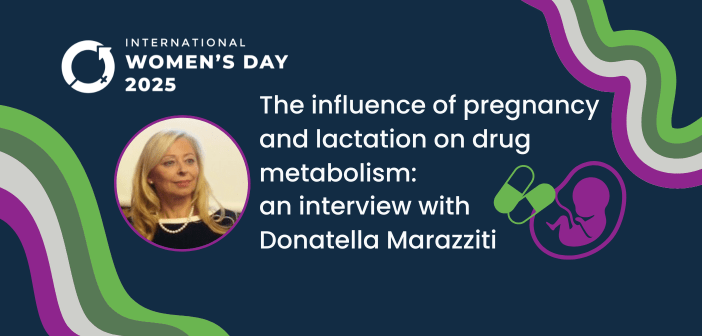The influence of pregnancy and lactation on drug metabolism: an International Women’s Day interview with Donatella Marazziti

Author: Donatella Marazziti, department of Psychiatry, University of Pisa (Italy)

Donatella Marazziti graduated in 1981 with an honors degree in Medicine, and qualified as a specialist in Psychiatry in 1985 and a specialist in Biochemistry in 1990. Currently she is a Professor of Psychiatry at the “Dipartimento di Medicina Clinica e Sperimentale”, department of Psychiatry at the University of Pisa (Italy), and is also a Professor of Clinical Psychology at the University of Pisa and at Saint Camillus University of Health Sciences (Rome, Italy).
Dr Marazziti is a member of several international and national scientific societies and committees, including, amongst others, the WPA section for OCD, the International Council for OCD, the Educational Committee of the ECNP and the Education and Award Committees of CINP, with multiple different affiliations. She is Co-Editor-in-Chief of CNS Spectrums, Funding Editor of Clinical Neuropsychiatry, Country Editor of Current Medicinal Chemistry, and a member of the Editorial Board of World Journal of Biological Psychiatry, Life and Annals of Psychiatry.
Dr Marazziti also serves as reviewer of projects of different European and non-European research agencies. She has participated actively in hundreds of meetings, seminars and teaching activities. Dr Marazziti’s research interests are focused on biological markers in psychiatric and normal conditions, emotions, attachment, psychopharmacology and clinical psychiatry. She has authored more than 650 papers, numerous chapters in books, nine books, two essays and one novel.
1. Your research spans clinical psychiatry, biochemistry and psychopharmacology. What sparked your interest in these areas?
My interest was sparked by my innate curiosity to disentangle the mystery of the brain and mind, as well as my passion to attempt to mitigate and/or resolve mental suffering.
2. You are currently undertaking research on psychotropic drugs in pregnancy and lactation – how do these states affect drug metabolism and efficacy?
Pregnancy and lactation are critical and unique periods in a woman’s life that can be a wonderful experience or a nightmare. Both pregnancy and lactation can exacerbate previous pathological conditions or cause new ones, which can impact drug metabolism and efficacy. The primary site of drug metabolism is the liver and pregnancy influences this hepatic metabolism. For example, rising levels of pregnancy hormones (including progesterone, estrogen and prolactin) in plasma can regulate the expression of metabolizing enzymes in the liver. During lactation, changes in milk pH and composition during the first postpartum week can influence drug excretion and retention in the breastmilk itself. It is important to take these factors into account, as most importantly, a woman bearing a baby reflects the own baby’s health and should be taken care of with all our efforts.
3. Are there specific biological markers present during pregnancy and lactation that influence the effects of psychotropic drugs in the body?
Unfortunately, to my knowledge, there are no currently available biological markers that might be used to predict the response to psychotropic drugs. With no doubt, cytochrome activity might be used in this sense due to their influence on drug bioavailability, action, resistance and safety through drug metabolism, as we are planning to do in future research.
4. How do these sex differences impact psychiatric treatment and personalized medicine?
This is a crucial question. We do know that the metabolism of drugs is different in men and women, that hormones and body weight and composition may modify some pharmacokinetic parameters, and that life cycles in women require specific drug adjustments, but most of them are neglected. These various sex-specific pharmacokinetic parameters can influence the efficacy of psychiatric medication. For example, during antidepressant treatment, women often show a better response to selective serotonin reuptake inhibitors (SSRIs) than men, while men tend to respond more favorably to tricyclic antidepressants. This difference is believed to stem from women producing more tryptophan and less cortisol when exposed to SSRIs. Additionally, women generally have lower activity levels of certain gastric enzymes, leading to higher drug plasma concentrations. Other physiological differences in women compared to men, including lower body weight, lower blood volume and higher fat percentage, also impact drug absorption and distribution, which in turn affects efficacy.
5. Do you think regulatory agencies and companies are doing enough to ensure sex-based differences are accounted for in drug development?
As far as I know, there are just initial and limited attempts to fill the knowledge gaps in sex-based differences for drug development, and that is a major problem in clinical studies. The entire scientific community, from researchers, to regulatory bodies and pharmaceutical companies, needs to do more to explore the sex-related differences in pharmacokinetics, and this should be a main focus of research.
6. What steps can be taken to improve drug safety and efficacy for women? Do you think there should be sex-specific dosage guidelines for certain medications?
Increasing knowledge in this field amongst physicians, pharmacologists and researchers, as well as awareness in the general public might be a useful approach. My opinion is that sex differences should be more thoroughly investigated to achieve a really personalized, sex-focused approach to medicine that might be even lead to specific guidelines for some drugs. For me, underlining sex-related differences might be a real step forward towards taking care of and adopting the best therapeutic strategies for every individual.
Disclaimer: the opinions expressed are solely those of the author and do not express the views or opinions of Bioanalysis Zone or Taylor & Francis Group.
Check out our other features for International Women’s Day 2025:
- Addressing sex differences in drug responses: an International Women’s Day interview with Sarah Allegra
- Breaking the bias in women’s health: exploring sex differences in drug metabolism and toxicology
- International Women’s Day 2025
- Article collection: Women’s health and sex differences in ADME research






